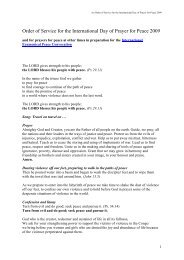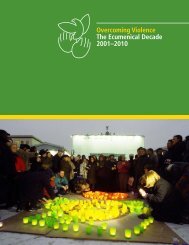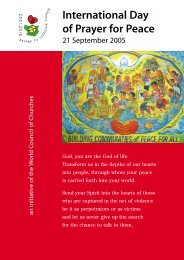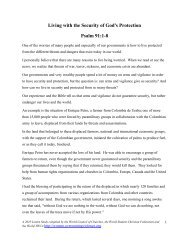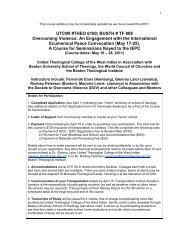Alternative Globalization Addressing Peoples and Earth
Alternative Globalization Addressing Peoples and Earth
Alternative Globalization Addressing Peoples and Earth
You also want an ePaper? Increase the reach of your titles
YUMPU automatically turns print PDFs into web optimized ePapers that Google loves.
33<br />
• open up space for communities <strong>and</strong> governments to exercise<br />
democratic control over critical financial issues that affect people’s<br />
lives; this includes the audit of financial debts as a means to identify<br />
illegitimate <strong>and</strong> odious debts;<br />
• reverse the flow of financial <strong>and</strong> ecological wealth from the South to<br />
the North by cancelling illegitimate debts <strong>and</strong> devoting 0.7% of<br />
industrialized countries’ Gross National Income to official development<br />
assistance - not as an act of charity but as restitution for past<br />
exploitation; <strong>and</strong><br />
• diminish the volume of speculative financial transactions <strong>and</strong> also<br />
raise significant revenues for genuine development assistance through<br />
a Currency Transactions Tax on the $1.9 trillion worth of currencies<br />
traded each business day.<br />
At the height of the Asian crisis in 1997, Malaysia defied IMF advice <strong>and</strong><br />
introduced a strict regime of capital controls that enabled the Malaysian<br />
government to adopt stimulative policies (including tax cuts), spend on<br />
infrastructure <strong>and</strong> lower interest rates without worrying about a run on<br />
its currency. In the end, even the IMF conceded that this policy was<br />
successful. At the national level, governments need to regain control over<br />
fiscal, monetary <strong>and</strong> taxation policies in order to deter excessive<br />
speculation, stop capital flight to offshore tax havens, <strong>and</strong> ensure that<br />
foreign investment is fairly taxed to provide for basic human <strong>and</strong> social<br />
needs. Governments should have the full autonomy to use the currency<br />
of their own choice. National governments need to move away from the<br />
neo-liberal ideology of lowering taxes for corporations <strong>and</strong> the wealthy.<br />
Tax reduction aims to provide the ideal climate for investment <strong>and</strong> free<br />
trade that limits the country’s ability to generate revenue to fund social<br />
development. Fair <strong>and</strong> just taxes include those taxes that promote<br />
ecological justice <strong>and</strong> reduce disparities in wealth, such as taxes on carbon<br />
emissions.<br />
4.5 Support for alternative financing at local levels<br />
The informal sector –the myriad activities taking place at the margin of<br />
the modern market economy– provides income for a majority of people in<br />
the South. It is in families <strong>and</strong> small enterprises that most people make<br />
their livelihoods. People working in one-to-five-person enterprises hold<br />
about half of the paid jobs in the world, <strong>and</strong> in some places, the percentage<br />
is even higher. Yet, the informal sector should not be romanticized, <strong>and</strong><br />
micro enterprises are not a panacea for human development. They have a<br />
mixed record of success <strong>and</strong> failure, <strong>and</strong> working conditions are often<br />
appalling. A major constraint is their lack of access to productive assets,<br />
notably l<strong>and</strong> <strong>and</strong> capital.




